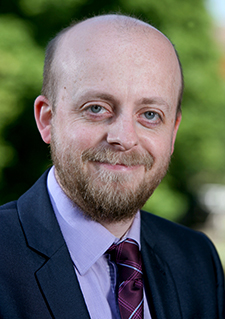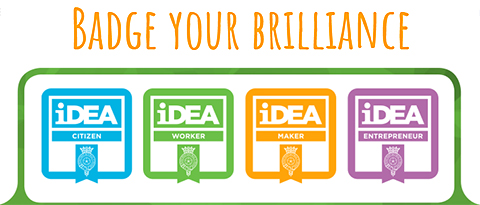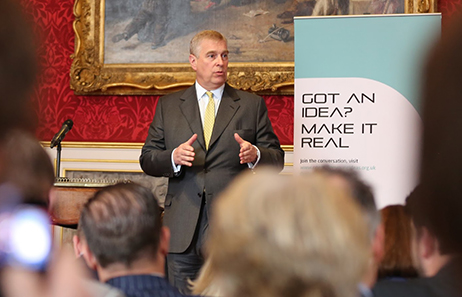Digital version of the Duke of Edinburgh Award launched

Thu, 16 Mar 2017 15:06:00 GMT
Professor Rupert Ward led the project on behalf of HRH The Duke of York to create the bronze level of The Duke of York Inspiring Digital Enterprise Award
 FOR more than 60 years, the awards scheme founded by HRH The Duke of Edinburgh has rewarded the endurance and enterprise of hundreds of thousands of young people. Now, an innovative educational programme fostered by his son, HRH The Duke of York, and developed at Buckingham Palace by a team including the University of Huddersfield’s Professor Rupert Ward (pictured left) will also offer participants the chance to earn bronze, silver and gold awards – this time by burnishing their skills and knowledge in ways that will aid their careers and boost the UK economy.
FOR more than 60 years, the awards scheme founded by HRH The Duke of Edinburgh has rewarded the endurance and enterprise of hundreds of thousands of young people. Now, an innovative educational programme fostered by his son, HRH The Duke of York, and developed at Buckingham Palace by a team including the University of Huddersfield’s Professor Rupert Ward (pictured left) will also offer participants the chance to earn bronze, silver and gold awards – this time by burnishing their skills and knowledge in ways that will aid their careers and boost the UK economy.
 It is named The Duke of York Inspiring Digital Enterprise Award and its Bronze Award is now launched online. After a quick and simple registration, anybody is free to go through the interactive, informative and educationally-innovative process of acquiring virtual badges in categories dubbed Citizen, Worker, Maker and Entrepreneur.
It is named The Duke of York Inspiring Digital Enterprise Award and its Bronze Award is now launched online. After a quick and simple registration, anybody is free to go through the interactive, informative and educationally-innovative process of acquiring virtual badges in categories dubbed Citizen, Worker, Maker and Entrepreneur.
The badges are described as “bite-sized challenges that help you learn digital and enterprise skills” and once enough have been passed to acquire a total of 250 points, a Bronze Award is earned. Over the next couple of years, the range of Bronze Award badges will grow and more challenging silver and gold awards will be launched.
Rupert Ward, who is Professor of Learning Innovation and Associate Dean (International) within the University of Huddersfield’s School of Computing and Engineering, was Project Lead for iDEA. He served for eighteen months as Special Adviser to The Duke of York – who is the University’s Chancellor and a passionate advocate for developing digital and entrepreneurial skills among young people.
 Professor Ward was on secondment at Buckingham Palace for the period, heading a team that created the Bronze Award.
Professor Ward was on secondment at Buckingham Palace for the period, heading a team that created the Bronze Award.
“The Bronze Award is particularly relevant and useful to pupils of secondary school age,” said Professor Ward, “and it can be used in the classroom. It is designed so that anyone could do it anywhere, and do it independently. You are not reliant on your teacher introducing you to it,” he added.
Professor Ward is delighted by early feedback from people who have visited the iDEA website and begun to explore the badges, each of which takes approximately 20 minutes to complete and is usually worth 10 or 20 points. Acquiring sufficient badges to earn a Bronze Award will probably require around nine hours of online interaction, carried out whenever and wherever a participant wishes.
“It’s a fundamentally different way of learning. It is telling young people that education is something that’s exploratory and inspiring. They can follow their own interests and combine these into something that is relevant and coherent,” said Professor Ward.
Long-established formal educational structures can be demotivating for many people, he added.
“But with iDEA, because it’s badge based and because it’s informal, you can find the things that interest you and also find the careers that interest you.”
“In today’s society, there are lots of new digital jobs that have only been out there in the last few years. By the time students leave school there will be further new jobs. It is more and more important that people know what’s going on, so what is needed is informal learning that supports formal education. That is what iDEA does,” said Professor Ward.
The scheme’s flexibility is such that companies wishing to recruit employees with special skills and aptitudes could set up their own badges in order to find the best candidates. This would “allow the badge store to grow to its full potential” although an accreditation system will ensure that quality is maintained, said Professor Ward.
Now that iDEA is up and running, he expects that the project – a digital equivalent to the long –established Duke of Edinburgh’s Award Scheme – will grow organically over the next five to ten years, until it becomes established as a national standard.







